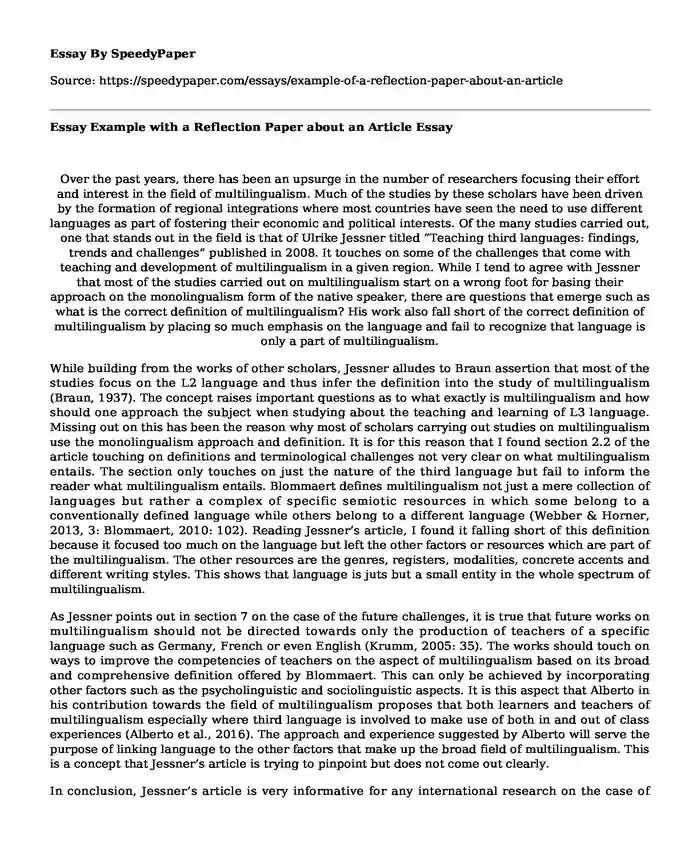
| Type of paper: | Essay |
| Categories: | Reflection Linguistics Languages |
| Pages: | 3 |
| Wordcount: | 810 words |
Over the past years, there has been an upsurge in the number of researchers focusing their effort and interest in the field of multilingualism. Much of the studies by these scholars have been driven by the formation of regional integrations where most countries have seen the need to use different languages as part of fostering their economic and political interests. Of the many studies carried out, one that stands out in the field is that of Ulrike Jessner titled “Teaching third languages: findings, trends and challenges” published in 2008. It touches on some of the challenges that come with teaching and development of multilingualism in a given region. While I tend to agree with Jessner that most of the studies carried out on multilingualism start on a wrong foot for basing their approach on the monolingualism form of the native speaker, there are questions that emerge such as what is the correct definition of multilingualism? His work also fall short of the correct definition of multilingualism by placing so much emphasis on the language and fail to recognize that language is only a part of multilingualism.
While building from the works of other scholars, Jessner alludes to Braun assertion that most of the studies focus on the L2 language and thus infer the definition into the study of multilingualism (Braun, 1937). The concept raises important questions as to what exactly is multilingualism and how should one approach the subject when studying about the teaching and learning of L3 language. Missing out on this has been the reason why most of scholars carrying out studies on multilingualism use the monolingualism approach and definition. It is for this reason that I found section 2.2 of the article touching on definitions and terminological challenges not very clear on what multilingualism entails. The section only touches on just the nature of the third language but fail to inform the reader what multilingualism entails. Blommaert defines multilingualism not just a mere collection of languages but rather a complex of specific semiotic resources in which some belong to a conventionally defined language while others belong to a different language (Webber & Horner, 2013, 3: Blommaert, 2010: 102). Reading Jessner’s article, I found it falling short of this definition because it focused too much on the language but left the other factors or resources which are part of the multilingualism. The other resources are the genres, registers, modalities, concrete accents and different writing styles. This shows that language is juts but a small entity in the whole spectrum of multilingualism.
As Jessner points out in section 7 on the case of the future challenges, it is true that future works on multilingualism should not be directed towards only the production of teachers of a specific language such as Germany, French or even English (Krumm, 2005: 35). The works should touch on ways to improve the competencies of teachers on the aspect of multilingualism based on its broad and comprehensive definition offered by Blommaert. This can only be achieved by incorporating other factors such as the psycholinguistic and sociolinguistic aspects. It is this aspect that Alberto in his contribution towards the field of multilingualism proposes that both learners and teachers of multilingualism especially where third language is involved to make use of both in and out of class experiences (Alberto et al., 2016). The approach and experience suggested by Alberto will serve the purpose of linking language to the other factors that make up the broad field of multilingualism. This is a concept that Jessner’s article is trying to pinpoint but does not come out clearly.
In conclusion, Jessner’s article is very informative for any international research on the case of learning and teaching third language as part of studies on multilingualism. It is every effective in pointing at the problems of using the old model of basing the research study on the case of monolingual form of the native speaker and thus fails to capture crucial aspects such as psycholinguistics and sociolinguistics aspects of multilingualism. Sadly, the article falls short of the definition that it is trying to articulate. It only points towards the problem of using monolingual form where language is the key component of multilingualism but fails to capture the other important elements such as genre, writing modalities and others. It is however a good source for anyone aiming to carry out studies on multilingualism where language is the only factor studies and other elements of multilingualism held constant.
Alberto, R. P., Gabinete, S., & Rañola, V. S. (2016). Issues and Challenges in Teaching Mother Tongue-Based Multilingual Education in Grades II and III: The Philippine Experience. Available at SSRN 2768558.
Krumm, H-J. (2005). Von der additiven zur curricularen Mehrsprachigkeit: U¨ ber die Notwendigkeit der Einbeziehung von Minderheiten-, Migranten- undNachbarsprachen. InHufeisen&Lutjeharms (eds.), 27–36.
Weber, J. J., & Horner, K. (2013). Introducing multilingualism: A social approach. Routledge.
Cite this page
Essay Example with a Reflection Paper about an Article. (2017, Oct 12). Retrieved from https://speedypaper.net/essays/example-of-a-reflection-paper-about-an-article
Request Removal
If you are the original author of this essay and no longer wish to have it published on the SpeedyPaper website, please click below to request its removal:
- E-Learning Technologies - Essay Samples
- Essay Example on Community Health Assessment
- Free Essay: Personal Reflection Paper on Positive Psychology
- Free Essay on The Legend of Sleepy Hollow - Compare Ichabod Crane and Brom Bones as American types
- Essay Sample on Psychological Implications of Social Media Use
- Essay Sample on Research Proposal on Training Model of Information Technology Application Ability
- Essay Sample on Supportive Psychotherapy Versus Interpersonal Psychotherapy
Popular categories




